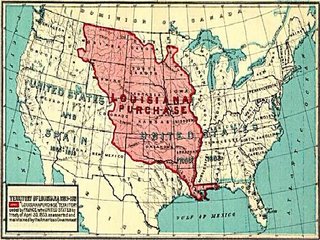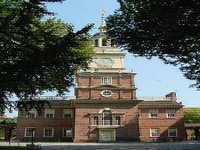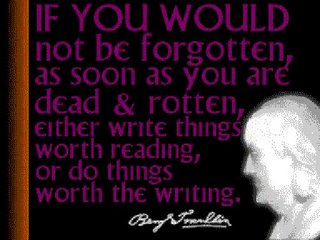 I have been working on teaching the film National Treasure to one of my classes. Then, gettnig all excited as you know I do, I decided to teach American History to all of my classes this week. I start them off with a picture of the Louisiana Purchase.
I have been working on teaching the film National Treasure to one of my classes. Then, gettnig all excited as you know I do, I decided to teach American History to all of my classes this week. I start them off with a picture of the Louisiana Purchase.Napolean I sold it to America in 1803 because he was fighting a fierce war with Spain (among others) and couldn't afford to lose the European battle. He also couldn't defend his non-continental land masses. So, he sold it to the US to gain money for his wars at home and save himself a possible defeat against the better prepared Spanish military in the western hemisphere.
This was an important purchase for the US (about $1,800 an acre by modern standards) because it doubled the size of the country overnight. The president who made all of that possible was Thomas Jefferson.
Then we move on to how Jefferson was a founding father (someone who figuratively found the country by helping to start it). Jefferson also had one other great achievement. What was it? It was this.
 But, because many of them are a little rough on their American history, we start with a picture. (A little out of proportion, sorry). The Declaration of Independence (1776), the Articles of Confederation (1781), and the Constitution (1787) were all signed or ratified here in Independence Hall. It was also the home of the Liberty Bell for 200 years. So then we look at the Declaration and do a comparison between Jefferson's rough draft (also in the Archives) and the one that was editted by John Adams and Benjamin Franklin before being changed again and then agreed upon by the Continental Congress. It is interesting to see how some phrases were broadened, while others were made more specific in the transition.
But, because many of them are a little rough on their American history, we start with a picture. (A little out of proportion, sorry). The Declaration of Independence (1776), the Articles of Confederation (1781), and the Constitution (1787) were all signed or ratified here in Independence Hall. It was also the home of the Liberty Bell for 200 years. So then we look at the Declaration and do a comparison between Jefferson's rough draft (also in the Archives) and the one that was editted by John Adams and Benjamin Franklin before being changed again and then agreed upon by the Continental Congress. It is interesting to see how some phrases were broadened, while others were made more specific in the transition.Still working with the constitution, we use an Ottendorf cipher (couldn't find real link there - it is possible that Ottendorf was more well known for his messages in invisible ink) to find the message: Human rights is the foundation of government. Which leads to a discussion of the Bill of Rights in the US and Les Droits De l'Homme in France. Following that, we do some interesting research on the Great Seal of the United States - there is an amazing occurrence of the number thirteen and symbols from Ancient Egypt, Ancient Rome, medieval knights, and jewish tradition to name a few.

Thomas Jefferson was the first Secretary of State, and therefore responsible for the Seal for a good number of years. So, I guess the lesson is more about Thomas Jefferson than anything else. Which doesn't really explain why I have a biography of Benjamin Franklin included in the packet. I think I am going to have to change that to Jefferson for tomorrow. But, Franklin was one of the people asked to design the Seal, so I guess I kind of just slide into his importance. So far, we haven't really gotten to the part of the lesson about Ben Franklin, but I haven't had any of my fast-talking good classes yet. We'll see.
I hope this is worth the reading. (Also, I should note, that I am well aware that this is not very French, but I am teaching it to French students who have never done it before and I am learning so much myself (like all those TJ connections and the stuff about the Great Seal).)
Hope you have enjoyed this recent dose of US History. Enjoy your day/night and remember all those who have fought for our freedom - even if it meant possibly losing their lives (you know, by becoming "traitors" and signing the Declaration or going off to war to fight for what they believed in). From your dedicated fellow citizen, ~Heather
Comments